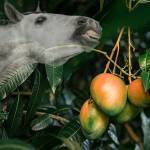For Gastric Health, Mangoes and Horses Don’t Mix

Horses readily consume all sorts of fruit and vegetables without any ill effects; others, however, are far more problematic. Avocados are toxic, for instance. Another damages the lining of the stomach and upsets the gastric environment. What is this fruit? The mango.
In Brazil, mangoes are present in many horse-grazing areas during the driest parts of the year, between September and March. Because there is less forage available in pastures at these times, horses often voluntarily consume mangoes.
“Mangoes are full of soluble carbohydrates, and diets rich in soluble carbohydrates may predispose horses to ulcers in the squamous or upper region of the stomach,” said Catherine Whitehouse, M.S., a nutrition advisor for Kentucky Equine Research.
“The stomach houses a microbial population that rapidly ferments dietary starch and sugar,” she explained. “The end products of fermentation are thought to be partially responsible for the development of ulcers by damaging the delicate lining of the stomach.”
Further, mangoes and other feeds high in soluble carbohydrates purportedly cause gastric relaxation, which shortens the passage time of these foods through the stomach. Because these feeds remain in the stomach for less time, the interval between meals is longer, which promotes a drop in pH, predisposing horses to ulcers.*
To determine the effect of mango consumption on gastric health, five horses were included in a study. The horses were maintained on pasture and offered supplemental Tifton hay. No concentrated feeds were offered during the study, which lasted from November to February, which coincided with the mango harvest season. Gastroscopies were performed on each horse at 15-day intervals throughout the study to directly visualize the lining of the stomach. The first gastroscopy was performed 30 days prior to harvest season and the last was performed 30 days after harvest season.
“Before the harvest, when mangoes were not available to horses, no gastric lesions were observed in these horses. Two horses rapidly developed gastric lesions early in the harvest when mangoes were readily available in pastures, and three horses had gastric ulcers by midharvest,” explained Whitehouse.
In total, four of the five horses had ulcers at some point during the study. All ulcers occurred in the squamous region of the stomach, and those lesions were assigned a grade of 2, 3, or 4 based on the four-point scale in which 4 denotes the severest ulcerations. By 15 days postharvest, no gastric lesions were noted in the horses.
The researchers concluded that the mangoes appeared to be the cause of the gastric ulceration in the squamous region of the horses’ stomachs. Those lesions, however, did not require treatment as they self-resolved following the mango harvest.
“These findings corroborate the idea that the incidence of gastric ulcers in athletic horses, when fed a large amount of soluble carbohydrates, often present gastric ulcers, but the reduction of feedstuffs with this characteristic can have a positive impact on the horse’s health, especially when combined with a reduction in the typical stress surrounding training and competition venues,” wrote the researchers.
Although mangoes did not make up a significant portion of the horses’ diets, they still negatively affected gastric health. Mango intake was not reported in the study. Only 1% of body weight in hay was provided when stalled, so perhaps it was the combination of low forage intake and mangoes that caused ulcers when compared to free-choice forage and mangoes.
“This study highlights the different challenges horse owners face based on growing conditions in different geographical locations. It is not uncommon for horse pastures to contain, or fences to be lined with, fruit trees that can pose similar management challenges,” said Whitehouse.
For horses either at risk for or affected by EGUS, offering ReSolvin EQ helps protect sensitive stomach tissue. This supplement contains a mixture of omega-3 and omega-6 fatty acids proven to resolve squamous gastric ulcers in 80% of horses treated.
*Silva, C.J.F.L., K.L.G. Trindade, R.K.S. Cruz, H.E.C.C.C. Manso, C.S. Coelho, J.D.R. Filho, C.E.W. Nogueira, F. Aragona, F. Fazio, and H.C.M. Filho. 2022. Effects of the ingestion of ripe mangoes on the squamous gastric region in the horse. Animals (Basel) 12(22):3084.








